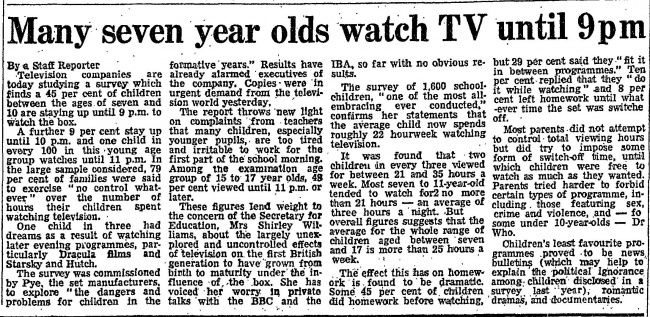Many seven year olds watch TV until 9pm
- Publication: The Guardian
- Date: 1978-05-10
- Author:
- Page: 1
- Language: English
Television companies are today studying a survey which finds a 45 per cent of children between the ages of seven and 10 are staying up until 9 p.m. to watch the box.
A further 9 per cent stay up until 10 p.m. and one child in every 100 in this young age group watches until 11 p.m. In the large sample considered, 79 per cent of families were said to exercise "no control whatever" over the number of hours their children spent watching television.
One child in three had dreams as a result of watching later evening programmes, particularly Dracula films and Starsky and Hutch.
The survey was commissioned by Pye, the set manufacturers, to explore "the dangers and problems for children in the formative years." Results have already alarmed executives of the company. Copies were in urgent demand from the television world yesterday."
The report throws new light on complaints from teachers that many children, especially younger pupils, are too tired and irritable to work for the first part of the school morning. Among the examination age group of 15 to 17 year olds, 48 per cent viewed until 11 p.m. or later.
These figures lend weight to the concern of the Secretary for Education, Mrs Shirley Williams, about the largely unexplored and uncontrolled effects of television on the first British generation to have' 'grown from birth to maturity under' the influence of, the box. She has voiced her worry in private talks with the BBC and the IBA, so far with no obvious results.
The survey of 1,600 schoolchildren, "one of the most all-embracing ever conducted," confirms her statements that the average child now spends roughly 22 hourweek watching television.
It was found that two children in every three viewed for between 21 and 35 hours a week. Most seven to 11-year-old tended to watch for no more than 21 hours — an average of three hours a night. But overall figures suggests that the average for the Whole range of children aged between 'seven and 17 is more than 25 hours a week.
The effect this has on homework is found to be dramatic. Some. 45 per cent of, children did homework before watching, but 29 per cent said they "fit it in between programmes." Ten per cent replied that they "do it while watching" and 8 per cent left homework until what -ever time the set was switched off.
Most parents did not attempt to central total viewing hours but did try to impose some form of switch-off time, until which children were five to watch as much as they wanted. Parents tried harder to forbid certain types of programme, including those featuring sex, crime and violence, and for some under 10-year-olds — Dr Who.
Children's least favourite programmes proved to be news, bulletins (winch may help to explain the political ignorance among children disclosed in a survey last year), romantic dramas, and documentaries.
Disclaimer: These citations are created on-the-fly using primitive parsing techniques. You should double-check all citations. Send feedback to whovian@cuttingsarchive.org
- APA 6th ed.: (1978-05-10). Many seven year olds watch TV until 9pm. The Guardian p. 1.
- MLA 7th ed.: "Many seven year olds watch TV until 9pm." The Guardian [add city] 1978-05-10, 1. Print.
- Chicago 15th ed.: "Many seven year olds watch TV until 9pm." The Guardian, edition, sec., 1978-05-10
- Turabian: "Many seven year olds watch TV until 9pm." The Guardian, 1978-05-10, section, 1 edition.
- Wikipedia (this article): <ref>{{cite news| title=Many seven year olds watch TV until 9pm | url=http://cuttingsarchive.org/index.php/Many_seven_year_olds_watch_TV_until_9pm | work=The Guardian | pages=1 | date=1978-05-10 | via=Doctor Who Cuttings Archive | accessdate=22 December 2025 }}</ref>
- Wikipedia (this page): <ref>{{cite web | title=Many seven year olds watch TV until 9pm | url=http://cuttingsarchive.org/index.php/Many_seven_year_olds_watch_TV_until_9pm | work=Doctor Who Cuttings Archive | accessdate=22 December 2025}}</ref>
